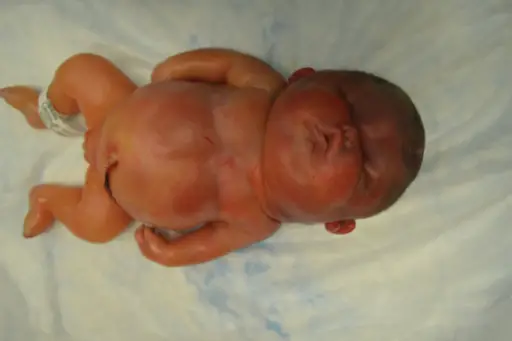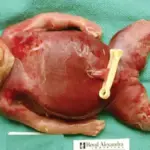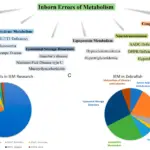Non-immune fetal hydrops is a severe fetal condition defined as the excessive accumulation of fetal fluid within the fetal extravascular compartments and body cavities, and is the end-stage of a wide variety of disorders. Non-immune fetal hydrops is typically due to fetal anemia, chromosomal anomalies, and cardiovascular defects.
What is the Pathology of Nonimmune Fetal Hydrops?
The pathology of nonimmune fetal hydrops is:
–Etiology: The cause of nonimmune fetal hydrops is a fetal medical condition or birth defect that affects the body’s ability to manage fluid.
–Genes involved: SPTA1 gene mutation
–Pathogenesis: The sequence of events that lead to nonimmune fetal hydrops are anemia induced hyperdynamic circulation, in which high-output cardiac failure causes the blood to circulate rapidly. The excessive pumping of blood causes the left side of the heart to fail, which may result in pulmonary edema. Pulmonary edema (the build up of fluid in the lungs) increases the pressure in the lungs leading to vasoconstriction. The coupled vasoconstriction and pulmonary hypertension causes the right side of the heart to fail which in turn, increases the venous hydrostatic pressure in the body, which leads to peripheral edema and ascites.
–Morphologic changes: The morphologic changes involved with nonimmune fetal hydrops are edematous fluid changes.
How does Nonimmune Fetal Hydrops Present?
Nonimmune fetal hydrops does not have a gender predisposition. Nonimmune fetal hydrops may present at any gestational period. The symptoms, features, and clinical findings associated with nonimmune fetal hydrops include anemia, difficulty breathing, enlarged liver, enlarged spleen, pale skin, and swelling.
How is Nonimmune Fetal Hydrops Diagnosed?
Nonimmune fetal hydrops is diagnosed by ultrasound that shows fluid accumulations involving the baby during gestation. Maternal laboratory tests may be ordered such as blood type, blood screen, antibody screens for TORCHES-CLAP, hemoglobin electrophoresis, maternal anti-SSA/SSB antibodies as well as Kleihauer-Betke and alpha-fetoprotein tests, can also aid in the diagnosis.
How is Nonimmune Fetal Hydrops Treated?
Nonimmune fetal hydrops is treated by thoracoamniotic drainage, antiarrhythmic drugs (digoxin, sotalol, propranolol) and blood transfusion when anemia is present.
What is the Prognosis of Nonimmune Fetal Hydrops?
The prognosis of nonimmune fetal hydrops is poor. Nonimmune fetal hydropshas a high mortality rate. An estimated 50% of babies with hydrops don’t survive until birth. In general, the earlier in the pregnancy the condition occurs, the greater the risk to the fetus.



